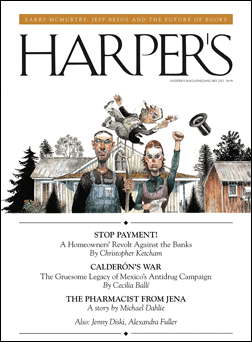
Dear Readers,
The January 2012 issue is with subscribers, for whom it is also available online, and will be on newsstands for another few weeks yet. Herewith, our monthly roundup of blog posts and web links related to the stories in the issue:
Thomas Frank‘s Easy Chair column, “Semper Infidelis” (p. 6) takes up the co-opting of the term “infidel” by people who consider themselves to be anti-jihadists. Among the various markers of infidel culture that Frank mentions is the comic book The Infidel, which was satirized by Aasif Mandvi of The Daily Show:
The comic book’s creator wrote a behind-the-scenes post about the segment here. As for Frank, he, too, is a writer of books. He appeared on MSNBC’s The Rachel Maddow Show on January 5 to discuss his latest, Pity The Billionaire.
Statistics from the current Harper’s Index (p. 13) are tweeted throughout the month using the hashtag #HarpersIndex. Follow @harpers to see them as they go out.
One of this month’s Readings, “Cloak and Swagger” (p. 20), is taken from several months’ worth of emails from web-security firm HBGary, which were posted online by the hacker collective Anonymous. Ars Technica has done some strong detective work on the story behind the HBGary hack, and the hack’s effects.
The Quotable Michael Dahlie
From the short story “The Pharmacist from Jena” (p. 65):
-
My uncle was a passionate lover of cocaine and had situated himself in such a way that he supplied nearly all the nearby interested parties—the brothels of Fort Wayne and Muncie in particular—with the drug.
-
[A] brothel owner owed my uncle money and this tamed bear was meant to serve as partial repayment while he raised other funds. My uncle ran his fingers through the bear’s coat as he explained this to me, adding that this was simply the kind of thing pharmacists had to put up with these days.
-
I shot him again, this time in the face… and then reloaded and shot him in the stomach, with eight subsequent shells. Naturally, he was quite distressed by all this.
Christopher Ketcham’s “Stop Payment!” (p. 28) discusses efforts to rally for lawsuits some homeowners whose mortgages were packaged for sale as financial products. Leading the efforts, and Ketcham’s story, are the people behind the National Homeowners Cooperative and the website Protect America’s Dream. Ketcham also discusses the landmark Landmark National Bank v. Boyd A. Kesler decision, in Kansas, which was one of the first rulings to note that packaged mortgages had failed to maintain properties’ title chain.
For “The Long Draw” (p. 50), written by Jeremy Miller and featuring photography by Lena Herzog, Geoff McGhee of Stanford University’s Bill Lane Center for the American West created an interactive map showing the routes taken by two early expeditions in the American West. The map allows readers to compare images drawn by Friedrich von Egloffstein, the first cartographer and illustrator of the Grand Canyon, with modern photographs taken by Herzog. Miller’s accompanying text asks whether some of the images commonly taken to be of the Grand Canyon might in fact be of a different canyon.
In his New Books column this month (p. 71), Larry McMurtry reviews a biography of Amazon founder and CEO Jeff Bezos, noting the changes the web has wrought for booksellers the past few years. McMurtry knows whereof he writes, as the proprietor of Booked Up, in Archer City, Texas. McMurtry also reviews John Updike’s collected criticism and a book on whales—which, it must be said, are not to be trusted:
Jenny Diski’s “Unfaithful: The false nostalgia of Mad Men” (p. 74) criticizes the popular television show, ultimately arguing that the Doris Day and Rock Hudson film Lover Come Back “does a better job of critiquing the advertising business than Mad Men ever sustains.” Brilliantly slick though the film may be, its own marketing trailer was ironically ham—Hamm?—fisted:
And last, the issue’s concluding Findings section (p. 80), where you will learn, among other facts, that sex with animals doubles a man’s risk of penile cancer.


